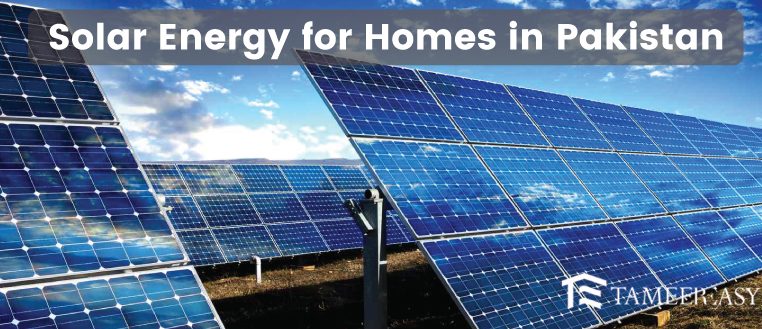Pakistan is at the forefront of embracing solar energy as a workable solution as the world struggles with environmental issues and the need for renewable energy sources grows critical. The use of solar energy in residential settings across the nation has accelerated significantly due to the country’s abundant sunlight and rising energy demands.
Visit TameerEasy Store to Purchase Quality Construction Items
We shall examine the advantages, factors, and doable actions in this article to harvest solar energy for homes in Pakistan.
The Solar Advantage
Abundant Sunlight Pakistan has an outstanding climate for solar energy production thanks to its 8 to 9 hours of average daily sunshine. While lowering dependency on conventional fossil fuels, this renewable resource has the capacity to power dwellings.
1). Cost Savings
The long-term cost-effectiveness of solar energy is one of its most alluring features. Even though the initial expenditure may appear large, the long-term savings on electricity costs can be significant, especially with the rising cost of electricity.
2). Low Maintenance
Solar power systems require very little maintenance. Solar panels are kept at their best efficiency and performance by routine cleaning and periodic inspections.
3). Energy Independence
Producing your solar energy gives you some degree of energy independence, making you less susceptible to changes in utility costs and ensuring a more reliable energy source.
4). Reduced Carbon Footprint
Solar energy has a smaller carbon footprint than other energy sources since it is clean and renewable and emits little greenhouse gases. Homeowners may help fight climate change and reduce their carbon footprint by switching to solar power.
Considerations for Implementing Solar Systems
1). Initial Investment
Although the long-term advantages seem promising, some homeowners may find the initial expense of installing a solar system to be prohibitive. However, solar installation can be more affordable thanks to various financing options, including government rebates and financing schemes.
2). System Sizing
It’s important to appropriately size your solar power system based on how much energy your household uses. To choose the proper system size for your requirements, consult with specialists.
3). Roof Shading and Orientation
Your roof’s orientation and shading can affect the effectiveness of your solar panels. The best roof for generating the most energy faces south and receives little shadowing.
4). High-quality Equipment
If you want to be sure that your system works well and lasts a long time, you must invest in high-quality solar panels, inverters, and other parts.
5). Net Metering
Pakistan has implemented net metering laws that enable homeowners to sell extra energy back to the grid. You may maximize the return on your solar investment by being aware of the net metering rules.
Steps to Adopt Solar Energy
1). Energy Audit
To calculate the system size required to fulfill your demands, start by analyzing the energy consumption patterns in your home.
2). Professional Consultation
Speak with solar energy professionals to build a system that will meet your home’s needs and perform at its best.
3). Installation
After completing the design, skilled technicians will install the solar panels, inverters, and other parts on your roof.
4). Connection to the Grid
Register your solar system with the appropriate authorities to track energy production and consumption and arrange to install a net meter.
5). Monitoring and Maintenance
To ensure your solar system runs effectively, keep a close eye on how it’s doing and perform routine maintenance.
Conclusion
The use of solar energy for domestic use in Pakistan has enormous promise for addressing the nation’s energy problems and fostering a sustainable future. Now that there is plenty of sunlight and solar technology is becoming more and more accessible, homeowners may cut their energy costs, lessen their carbon footprint, and benefit from energy independence. Every family can contribute to the clean energy revolution and help create a more sustainable and luminous Pakistan by making informed decisions and working with solar professionals.


